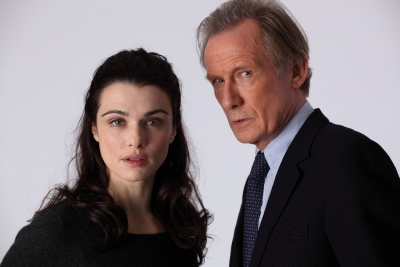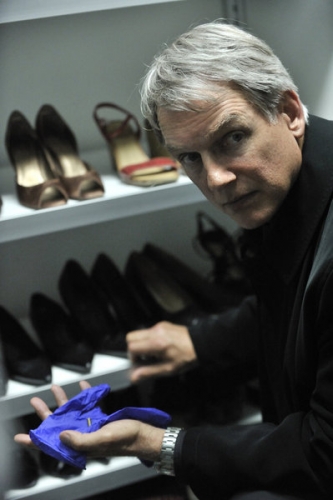 It’s worth re-watching the 1979 mini-series of John LeCarre’s Tinker Tailor Soldier Spy because David Hare’s Page Eight on Sunday, Nov. 6, on PBS’ Masterpiece Contemporary series illustrates how little things have changed in the ethically murky world of intelligence gathering.
It’s worth re-watching the 1979 mini-series of John LeCarre’s Tinker Tailor Soldier Spy because David Hare’s Page Eight on Sunday, Nov. 6, on PBS’ Masterpiece Contemporary series illustrates how little things have changed in the ethically murky world of intelligence gathering.
In the 21st Century, Hare shows, the Soviet threat has simply been replaced with the terrorist threat; there’s still as much treachery inside MI-5 as outside. Only now, the bastardized use of that intelligence is even more about the expediency of political survival by the powers-that-be.
Blessed with a first-rate cast down to the supporting players plus an incisive script and deft direction by Hare, Page Eight is a riveting yet underplayed political thriller that is equally an inquiry into the internal human struggle between corruption and integrity.
The plot focuses on Johnny Worricker (the brilliant Bill Nighy), a world-weary intelligence analyst who is second in command to MI-5’s chief, the aging Benedict Baron (Michael Gambon).
Baron has discovered a document revealing with undeniable specificity that the British’s intelligence partner, the Americans, have been torturing people in secret prisons around the world – and that somebody highly-placed in the British government has known about it and suppressed information that could have saved British lives.
The resulting machinations and maneuverings force Johnny into a series of seemingly no-win choices that will test his skill and his honor.
The tall, slender Nighy inhabits the skin of a latter-day George Smiley, externally a gray drone, but internally the master of a vital and keen intelligence. You can see his mind evaluating everyone he meets to consider whether they are a friend, an enemy, a friend-turned-enemy.
Worricker is an old-school true believer. He tells a disenchanted field agent: “The purpose of intelligence is to find the truth, not to confirm what we already believe. We’re meant to look for what’s there, not what we want to be there.”
But the agent responds, “Come on, Johnny. Once they wanted Communists; we gave them Communists. Now they decide they want Arabs; we find them Arabs. Nothing’s changed.”
 This territory is not new. The ongoing British TV series MI-5 (or Spooks) covers similar ground, as did the 1978-80 British TV series The Sandbaggers.
This territory is not new. The ongoing British TV series MI-5 (or Spooks) covers similar ground, as did the 1978-80 British TV series The Sandbaggers.
But throughout a career writing plays and making films, Hare has returned repeatedly to exploring the difficulty of maintaining one’s ethics in a morally ambiguous world. Like John le Carré, Hare knows that the real fascination is not the drab bureaucracy of intelligence work, but the damage that a morally compromised world inflicts on individual’s humanity.
Throughout Page Eight, the questions people ask each other have to do with loyalty and trust and, by extension, the principles that define worthwhile human beings.
At one point, Benedict tells Worricker after regretting not briefing him, “Distrust is a terrible habit. You find that? There’s a fine line between calculation and deceit.”
Hare has collected a simply impeccable cast led by the subtle skills of Nighy and Gambon. But also on board are the lovely Rachel Weisz as his suddenly-friendly Syrian neighbor with a tragic past; a care-worn Judy Davis as Worricker’s pragmatic nemesis inside MI-5, Alice Krige as Worricker’s ex-wife, Saskia Reeves (the first season boss in Luther) as the Home Secretary out of her depth, and Ralph Fiennes delivering a slick, creepy political equivalent of Voldemort as Prime Minister. Even the cameos are staffed with stellar actors such as Marthe Keller.
This is don’t miss television. And if you do miss it, you can catch Page Eight on pbs.org or on DVD, which will be released Nov. 8. It’s worth the effort.
While we’re in the neighborhood, here’s a final question: Why have almost all great filmed political thrillers originated in England (Costa Gavras’ Z and John Frankenheimer’s The Manchurian Candidate notwithstanding). With a few exceptions, all American films of this ilk are thefts and remakes of British originals.
Page Eight airs at 9 p.m. Nov. 6 on PBS; check your local listings.
Photos: Bill Nighy and Rachel Weisz; Judy Davis. PBS photos
 Corporations do it; so do organizations; and so do people.
Corporations do it; so do organizations; and so do people. Fans can vote for a favorite author online - with each vote contributing £1 to the fund raiser. A British £1 is equal to about $1.50 in American money, but the exchange rate changes daily.
Fans can vote for a favorite author online - with each vote contributing £1 to the fund raiser. A British £1 is equal to about $1.50 in American money, but the exchange rate changes daily.

 The made for TV movie is based on
The made for TV movie is based on  It’s worth re-watching the 1979 mini-series of John LeCarre’s Tinker Tailor Soldier Spy because David Hare’s Page Eight on Sunday, Nov. 6, on PBS’ Masterpiece Contemporary series illustrates how little things have changed in the ethically murky world of intelligence gathering.
It’s worth re-watching the 1979 mini-series of John LeCarre’s Tinker Tailor Soldier Spy because David Hare’s Page Eight on Sunday, Nov. 6, on PBS’ Masterpiece Contemporary series illustrates how little things have changed in the ethically murky world of intelligence gathering. This territory is not new. The ongoing British TV series MI-5 (or Spooks) covers similar ground, as did the 1978-80 British TV series The Sandbaggers.
This territory is not new. The ongoing British TV series MI-5 (or Spooks) covers similar ground, as did the 1978-80 British TV series The Sandbaggers.
